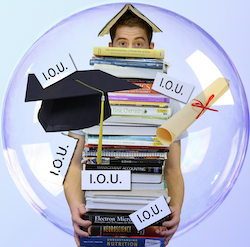A few short months ago, I was one of a small number of experts in parenting and education. I’ve been a teacher and I built two schools from scratch. That’s some serious expert credibility.
Enter the coronavirus. Now every parent is a teacher and every parent has built their own school at home. And I’ve taken a call while cleaning a toilet—no, it was not a video call and I was on mute. Yes, I said cleaning, not using. I’m not a Supreme Court justice, for crying out loud.
When the pandemic shuttered our schools, no group was more worried than parents. Classes on Zoom were brand new to most families. Schools scrambled to figure out how to transition to the new reality. And I just can’t seem to figure out how Google Classroom works. Confusion and concern have enveloped us all.
Parents began to call me, pretty much ALL worried about the same thing: “I’m terrified that my kids are going to be behind.” This, of course, is a perfectly reasonable concern. As I pressed these parents on what they meant by “behind,” most said they were worried about academics (thankfully, nobody cried about their 4th-grader not getting into Harvard). I wondered if reality matched the anxiety.
Because of my years working in schools, parents expected me to have “the answer.” But I didn’t have the answer (please don’t tell my friends). Look, I’m still at home too. I’m finding spatulas in my desk drawers and socks with the silverware. No, I didn’t have the answer, but I had my suspicions. I needed more information. Thus, I began speaking to teachers and education leaders from public schools, private schools, and charter schools, and from all grade levels. What I found was surprising and enlightening.
I’m not going to keep you in suspense any longer in case this is as far as you want to read. The message was clear: Relax. Your kids are not falling behind. There are three main themes that emerged from my conversations.
Behind What?
What does being “behind” actually mean? Will students be able to excel in the next grade level? Will they learn enough math? (I, for one, can’t understand 6th-grade math, but that’s another story.) In general, teachers view this question of being “behind” more broadly.
First, a brief background on the actual material our kids are supposed to learn. In 2010, 40 states adopted the Common Core Standards, a set of broad skill-based standards. But local education officials are free to develop whatever curriculum they wish. The standards articulate the fundamentals but do not list exactly what should be taught. For example, they may refer to particular content forms like mythology or foundational U.S. documents, but do not dictate the specific content that students should learn.
It’s an open secret among educators that the state and local benchmarks are near-impossible to meet in a regular school year. So does that mean that anyone is really behind? Educators are confident they can catch kids up academically. “We will meet them where they are in the fall, and go from there,” a middle school teacher told me. “You’re always amazed at the change and growth in any given student during a school year. That’s not always something parents see.”
Let’s have a reality check—ALL students are in the same situation.
“Academics are essential but not particularly complicated,” one elementary school teacher said. Plus, she has heard of “no school or district that has been crushing the online game.” Yes, things are definitely uneven from school to school (your kid has four hours a day? Mine only has one!), but she and others had a different notion of how students may be “behind.”
Social-Emotional Concerns
The top concern of every educator I spoke with was the social-emotional toll the coronavirus may have. Children need outlets for their emotions, and school is often the bubble where kids feel safe. Teachers can help students grow academically, but it becomes exponentially more difficult if students return to school emotionally traumatized. “Teaching is my superpower,” another elementary teacher said. “I can make a kid learn, but what I can’t do from a distance is help with emotional skills.”
Educators worry there will be a backslide in problem-solving, willingness to engage in uncomfortable topics, and maintaining friendships. “Developing those skills is how you have a successful life,” the teacher with superpowers told me. “More and more kids are encountering mental strain. In the fall I hope to spend more time on the social. The ability to navigate social situations while keeping your cool is really hard.”
As I started to sink into my own despair, one middle school teacher offered some hope. There may, in fact, be social-emotional benefits from this experience. He posited whether “it’s possible that given this crazy circumstance, like WWII or 9-11, there may be a level of grit that kids haven’t had before. They may be behind in some situations but ahead in others.”
Don’t worry so much, one K-8 principal said, “Don’t fight with your kid. Don’t stress. Teachers can fix academics. What they can’t fix is three months of despair.” She didn’t help me at all with parental despair. Not mine of course. I’m asking for a friend.
School Is Going to Change
The education upheaval spares no student. Schools are going to make adjustments. They have to. Educators understand that when the time comes to return to in-person classes, things are going to be different even though nobody really knows how.
In general, though, there’s a consensus that the most important thing schools will do is assess students academically and emotionally. And they will do it often. Teachers have to know how each student has been impacted and tailor their teaching to the needs of the kids. “We’re going to have to be very intentional,” one teacher said. “More than ever we need to know what we have walking in and then we will have to differentiate and focus on skills.”
Let’s All Take a Breath
For better or worse, education is not going back to the way it was. From preschool through university, we have entered a new world and it’s going to take a while to settle in. These are anxious times, no doubt about it. Instagram is chock-full of parents drinking before noon. I’ve done a number on my fingernails (worse than usual, but at least I don’t have in-person meetings). Reopening is not going to be easy or smooth. It’s hard enough in normal times to run schools. Remote learning has exposed a lot of issues with the education system. Our kids are not behind. There are lessons to be learned that will eclipse academics and will be with our kids for the rest of their lives. And your kid will still get into Harvard (not likely, but it’ll make a few people feel good to hear it).



